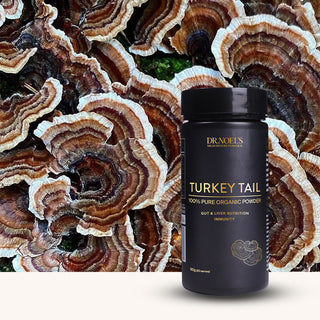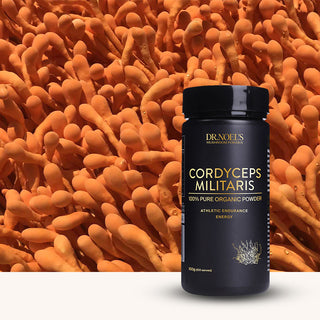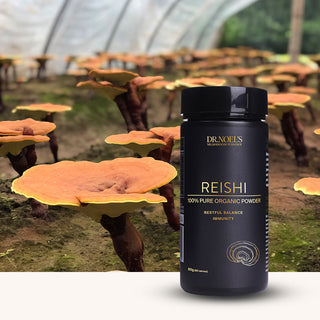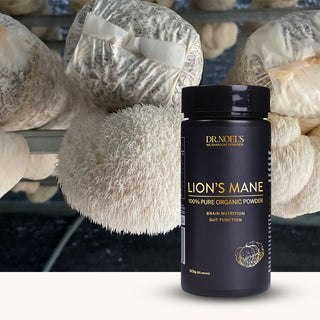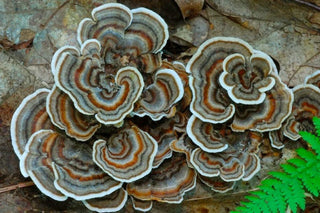
Turkey tail mushroom is most commonly praised for its capacity to boost resilience against viruses and pathogens. Still, one of the lesser-known abilities of this medicinal powerhouse is its benefits for optimal gut health.
We have long known that the food we eat gets converted into nutrients and energy so that we might lead rich and fulfilling lives. But more recently, researchers have discovered that our gut contains trillions of microbes, including bacteria, viruses, fungi, and protozoa, all of which are connected to immunity, homeostasis, mood, heart health, mental health, and general well-being.
Turkey Tail is starting to get greater notoriety for its capacity to restore the number and diversity of beneficial bacteria in the gut. It is a well-known prebiotic source largely because of its special PSP and PSK polysaccharides. Turkey tail, like the majority of mushrooms, also contains fiber, an indigestible component of plant foods that promotes a healthy digestive system.
Continue reading to discover the benefit of Turkey tail for gut health and simple ways to integrate it into your routine for vigor and wellness. But let’s begin by having a clearer understanding of gut health.
What Is Gut Health?
Today, there is a lot of discussion in the health community about the significance of gut health and microbiome integrity. Sometimes when we hear the phrase “gut health,” we would instinctively assume that it refers to proper digestion, but this is really just the tip of the iceberg. About 70% of our immune response is controlled by our gut, and nearly all of the body’s serotonin—which affects both our mood and gastrointestinal function—is produced by the bacteria that live there.
You may think of the stomach as the base of good health for the entire body. The gut microbiome of each person is completely unique, similar to a fingerprint, and is made up of trillions of different microorganisms. In an ideal world, these microorganisms would cooperate harmoniously to support the overall health of the body, essentially assisting you in feeling better and having more energy.
A healthy and balanced gut microbiome helps us absorb nutrients from food, influences the brain and immune system, and also regulates our metabolism, heart health, skin health, hormone balance, and much more. Hippocrates, the father of natural medicine, rightly said over 2,500 years ago that “all disease begins in the gut.”
Benefits Of Turkey Tail Mushrooms For Gut Health
The gut microbiome is one of the most densely populated microbial communities globally. It contains many helpful bacteria that perform many essential tasks for maintaining human health. The composition and metabolic activity of the gut are balanced by various environmental factors, including nutrition, which is becoming a more important environmental element. Prebiotics and other essential dietary elements must be consumed to support healthy bacteria.
Prebiotics are nutrients that have been specifically fermented to encourage particular changes in the structure and function of the gut. They nourish the good bacteria, unlike probiotics, which are the beneficial bacteria in fiber-rich foods like fermented yogurt and kimchi.
Turkey tail is beneficial for the gut because of its abundant contribution of prebiotics. It also has a positive influence on overall digestive health, which is why prebiotics is necessary for the probiotics to thrive.
Additionally, Turkey tail has a wide variety of naturally occurring substances that promote intestinal health, which is linked to a strong immune system. It contains more than 35 phenols and potent flavonoids, which are all abundant in antioxidants.
In particular, the mushroom is renowned for its strong natural polysaccharides, such as polysaccharide K (PSK) and polysaccharide peptide (PSP), which support healthy gut flora and the immunological barrier, which aids the immune system in protecting against disease.
Exploring The Research Behind Turkey Tail Mushroom Benefits
Increases diversity of gut bacteria
According to studies, Turkey Tail helps the gut recover by increasing the diversity of gut bacteria and supporting prebiotics. For instance, a study looked at the prebiotic effects of polysaccharopeptide PSP from Turkey tail on the gut flora[1].
Over the course of eight weeks, 2600 mg of PSP Turkey Tail extract was administered to 24 healthy volunteers. Each participant in the active treatment groups had their stools examined seven times over the course of eight weeks, compared to three times for the controls.
There were no significant changes in the gut microbiome for the control group (which got no therapy) (which makes sense). The group that received the Turkey tail extract showed improved gut bacterial alterations and signs of harmful bacteria’s growth being inhibited (like E. coli and Shigella). Turkey tail has won big here.
The group receiving antibiotics observed significant microbiome changes, including a rise in several harmful bacteria (the relationship between antibiotics and gut microbiota is complex; this is not a call to disregard current findings, however).
The findings supported the prebiotic activity of Turkey Tail by demonstrating clear and consistent improvements in the microbiome’s health and increases in “good” bacteria. Researchers have concluded that the mushroom can modify the composition of the human intestinal microbiome by acting as a prebiotic.
Additionally, other data suggest that PSP controls the gut microbiota by balancing the proportions of good bacteria in the intestines (2).
These findings were corroborated by a test-tube study (3). The researchers discovered Turkey Tail extract changed the composition of the gut bacteria by increasing the population of helpful strains of gut bacteria Bifidobacterium and Lactobacillus and decreasing the population of potentially harmful bacteria Clostridium and Staphylococcus.
Alleviates colonic inflammation
In another animal study, the YZP protein isolated from fruiting bodies of Turkey tail mushrooms significantly alleviated the disease activity and colonic inflammation in acute colitis (4). The protein stimulated specific types of white blood cells, which exhibited anti-inflammatory effects beneficial in colitis.
According to studies, PSP and PSK isolated from Turkey tail mushrooms have substantial immune-supporting properties that may be activated when they come into contact with immune cells in the digestive tract (5).
Primordial immune receptors in our digestive tract recognize the distinct beta-glucans. It then triggers a complex immune response that includes increased monitoring and production of antibodies to target dangerous infections and immune system components that aren’t working as well as they should.
Protein-bound beta-glucan (PBG), a substance found in turkey tail, may help prevent obesity, according to some research (6). For instance, a study on mice revealed that PBG prevented weight growth in those who consumed a high-fat diet. Based on the findings of the study, PBG may assist in balancing specific gut flora, which can help prevent obesity.
A 2022 study found that Turkey tail inhibits some inflammatory pathways and may have an anti-colitis effect (7). The mushrooms were given orally to mice at a dosage of 200 mg per kg every day for four days. The tissues were subsequently removed for histological, biochemical, and molecular examinations.
Weight reduction and intestinal alterations were substantially less noticeable after Turkey tail treatment. The mushroom also enhanced the architecture of the colon and reduced the production of cytokines that cause inflammation. The findings of this study unequivocally demonstrate that this natural substance may be used as a dietary supplement to treat colitis.
In a nutshell, scientific research indicates that when using Turkey tail mushrooms as a supplement, the mycelium of the fungus may aid in a more effortless digestive process. The excellent prebiotics in the mushroom supports the microbiome. This indicates that it may promote the development of healthy bacteria in the body, such as acidophilus and bifidobacterium, which is even more advantageous for those with leaky gut syndrome.

Ways To Include Turkey Tail Into Your Gut Wellness Routine
Like other functional fungi, Turkey tail truly shines when taken regularly, whether in food, as a tea, or in supplements. Even though it has a moderate, earthy flavor and is regarded as an edible fungus due to its slightly leathery texture, the mushroom is often taken in powder form.
Turkey tail mushroom powders can be added to soups or a gut-nourishing smoothie. The powder is also a simple ingredient to incorporate into a major dish, snack, dessert, or beverage of your choice. It has a moderate flavor that some people describe as slightly sweet.
Stir it into bone broth, porridge, or hot tea in the colder months; in the warmer months, combine it into shakes or even whisk it into a salad dressing. Both single-species supplements and multi-mushroom mixtures are available.
Bonus tip: The active prebiotic components of mushrooms (polysaccharides) are best extracted in water. To benefit from this versatile mushroom’s hydrating and calming properties, it is best to make mushroom tea or combine the mushroom powder with hot water and sip it after a big meal.
FAQs About Turkey Tail Mushroom Gut Health Benefits
Is Turkey Tail A Probiotic?
Turkey tail mushrooms contain prebiotic fiber. Researchers discovered that the mushroom enhances the gut microbiota by acting as a prebiotic and encouraging diversity in the gut. It has been demonstrated that PSK also supports gut health with prebiotics.
Do Turkey Tail Supplements Have Any Side Effects?
The majority of healthy people well tolerate supplements containing Turkey tail. Some patients receiving chemotherapy with polysaccharide krestin (PSK), a chemical derived from turkey tail mushrooms, have complained of nausea, vomiting, low white blood cell counts, and liver issues.
Key Takeaways
The health advantages of Turkey tail for the gut are great, but what’s possibly even more impressive are the long-lasting consequences of a healthy gut on one’s general well-being. One benefit is that it makes it easier for essential nutrients like B12 and vitamin D to be absorbed, which lowers the risk of digestive diseases like colon cancer, colitis, IBS, and Crohn’s disease. However, it has also been demonstrated to boost energy and encourage healthy weight loss.
Do your gut (and every other part of yourself) a favor by enhancing your morning coffee, post-workout smoothie, or an afternoon pick-me-up with Turkey tail mushroom supplements.
References
- https://pubmed.ncbi.nlm.nih.gov/25006989/
- https://www.mdpi.com/1422-0067/18/9/1934/htm
- https://www.researchgate.net/publication/235717058_Trametes_versicolor_Extract_Modifies_Human_Fecal_Microbiota_Composition_In_vitro
- https://pubmed.ncbi.nlm.nih.gov/24019869/
- https://pubmed.ncbi.nlm.nih.gov/15726350/
- https://onlinelibrary.wiley.com/doi/abs/10.1002/mnfr.201801231
- https://www.mdpi.com/2076-3921/11/2/406/htm
